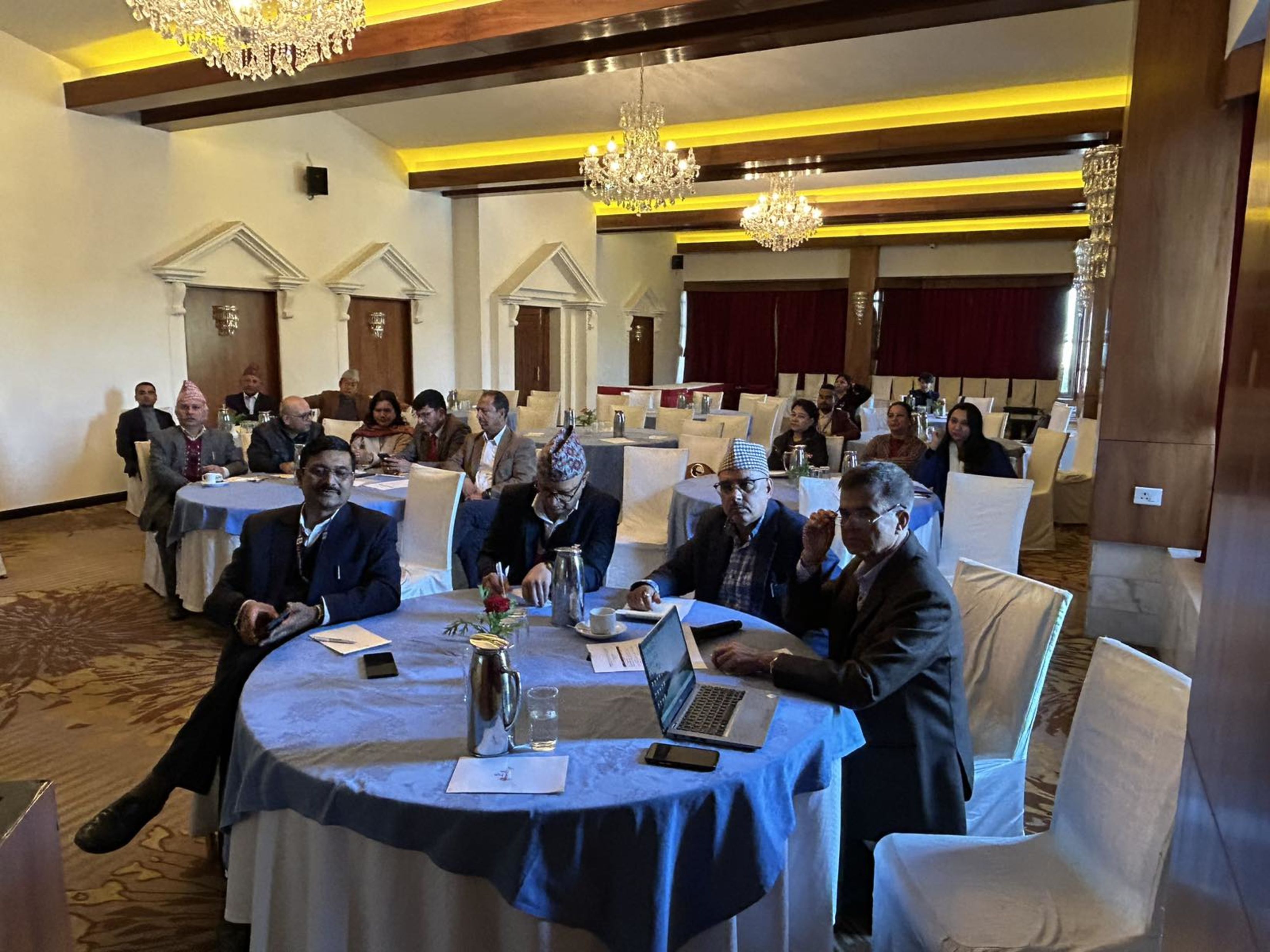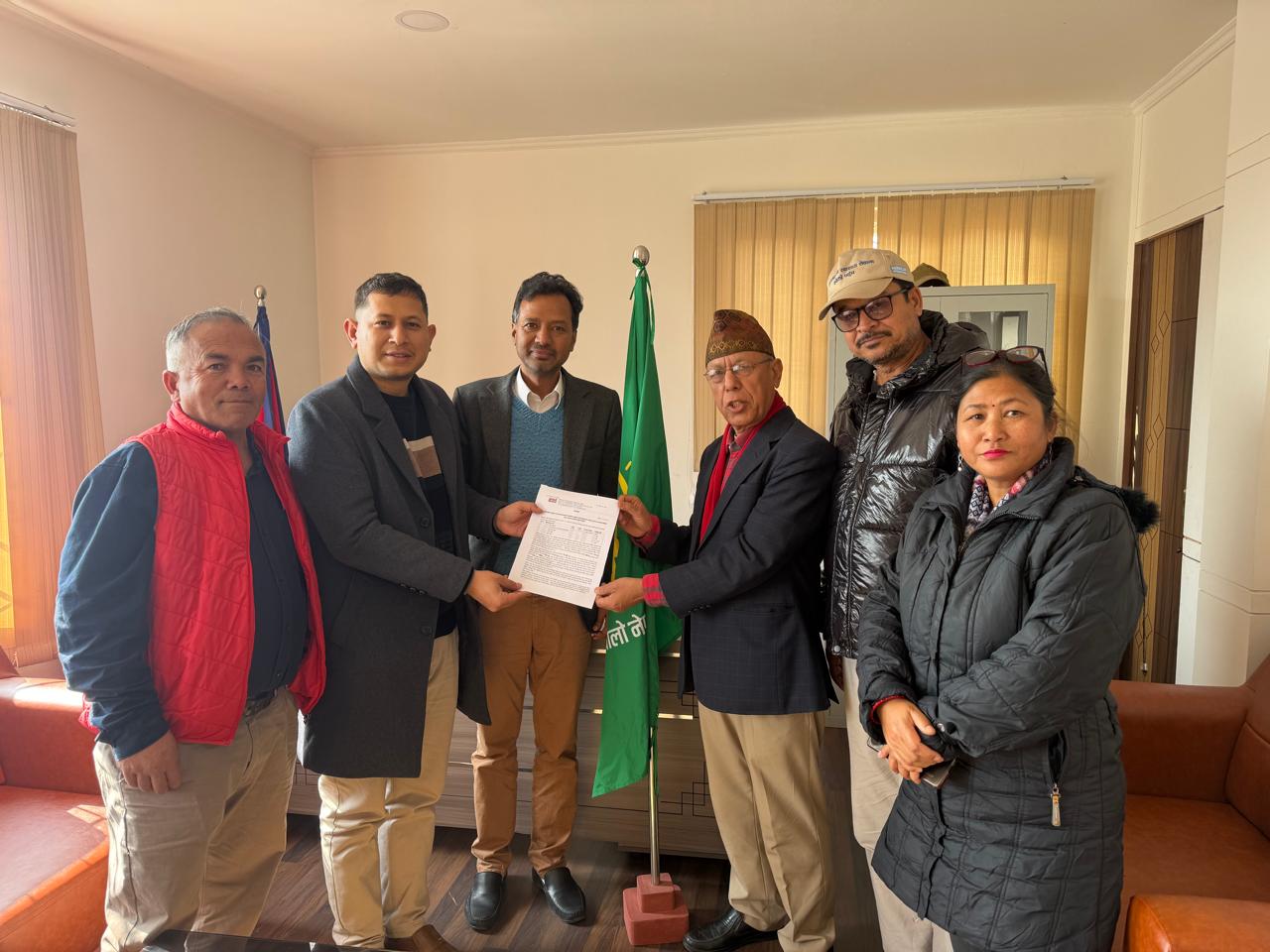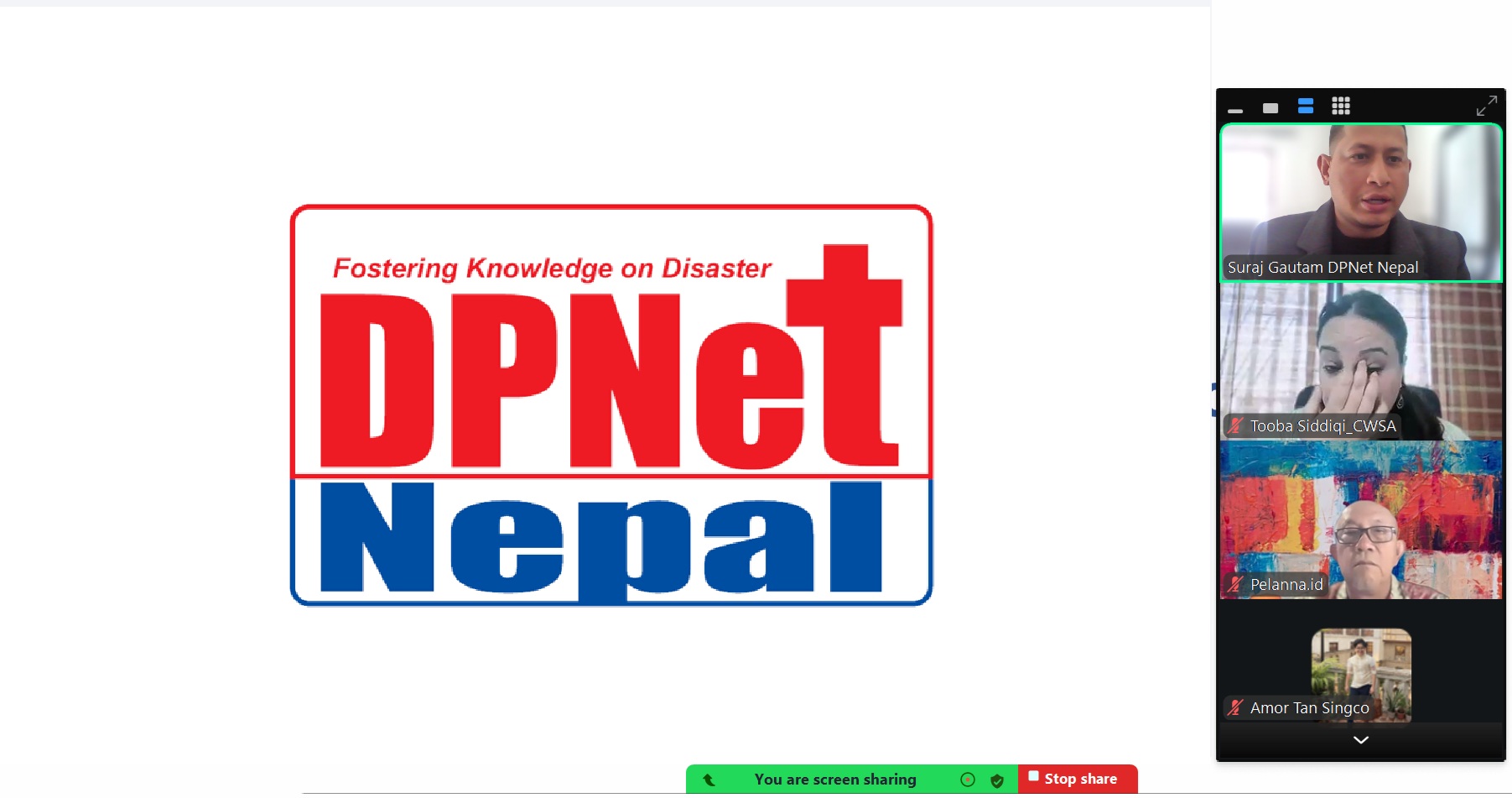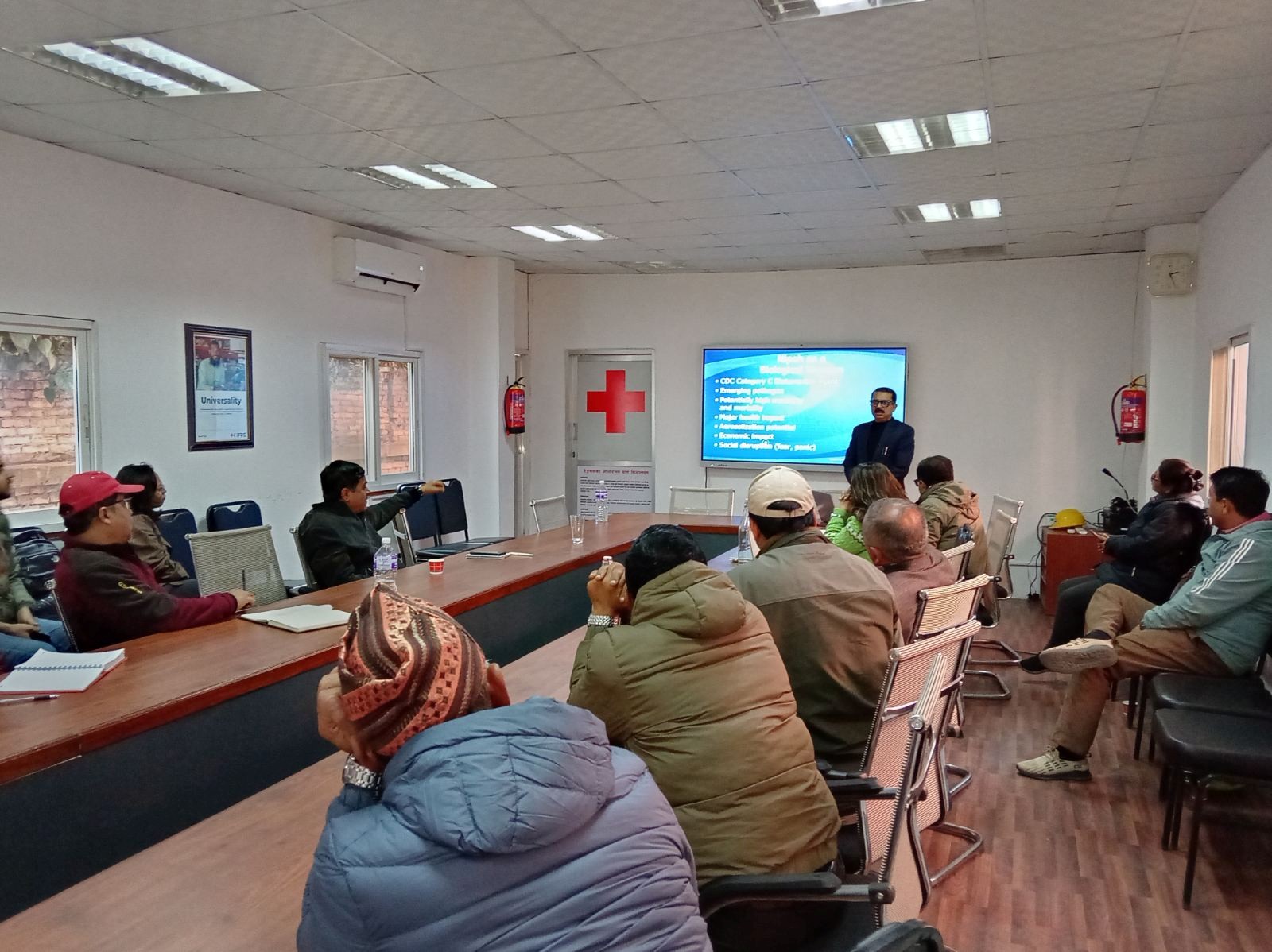Participatory Review and Reflection Workshop of SUDRIDH Project

On December 5, 2023, DPNet Nepal, in collaboration with USAID Tayar Nepal, organized the Participatory Review and Reflection Workshop of the SUDRIDH Project chaired by Mr. Surya Bahadur Thapa, Chairperson of DPNet, the event featured discussions led by Mr. Kshitiz Paudel, Program Coordinator at DPNet, who highlighted the project’s phases and learnings. Ms. Sujata Chhetri Pandey, Sr. Admin/Finance at DPNet, covered the financial aspects of the project. Notable guests included Mr. Kedar Neupane, Former Secretary of the Government of Nepal, Mr. Jaya Narayan Acharya, Joint Secretary from NDRRMA, Mr. Rishi Raj Acharya, Under Secretary from MoFAGA, Mr. Dhruba Khadka, Under Secretary from NDRRMA, Ms. Bandana Kumari K.C., Under Secretary from MoHA, and Ms. Krishna Karkee, Disaster Preparedness and Response Specialist from USAID Tayar Nepal, among others. Additionally, past chairs, advisors of DPNet, and representatives of agencies actively involved in DRR attended the event.
Mr. Kshitiz Paudel started the event with a brief highlight of the program, to discuss the learning throughout the phases of the project and look forward to a future pathway and handed over to the DPNet Vice-chair who highlighted the SUDRIDH project in brief and its impact.
Dr. Raju Thapa, Vice-Chair, DPNet Nepal highlighted the fact that USAID Tayar Nepal’s collaboration has become very fruitful over the period. He emphasized that the SUDRIDH Project stands out as one of the most significant undertakings in the history of DPNet Nepal. He underscored the remarkable activities conducted during the project period, namely; National Level Policy Dialogues for Policy Advocacy and Implementation, the Provincial Level Policy Dialogue and Learning/Sharing for Implementing and Strengthening DRR Policies and Strategies, and the National Conference on DRR to share good practices and lessons learned for exploring a way forward for plans and policies on DRR, this year 2023 marking the mid-term of SFDRR. Another important activity conducted was making progress on the two major online platforms of DPNet ORC and VDRR. He shared that the ORC is the complete depository of scattered materials and the VDRR is the digital platform for raising and discussing contextual issues. From the discussion of ORC and VDRR sessions, it can be concluded that the main challenge is to maintain the sustainability of this portal even with or without a project. He also acknowledged that even though DPNet is an umbrella organization for several organizations working in the field of DRR, it does not possess the mechanism to participate in competitive processes to seek and undertake the project.
Dr. Thapa proceeded to highlight the initiation taken by DPNet in preparing situation reports of the recent earthquakes in Jajarkot and Bajhang that have aided in assessing the factual condition and needs of the people of those regions making it easier to the response efforts. He shared that DPNet, in collaboration with AIN, has developed a comprehensive spreadsheet containing 5W questions to streamline relief distribution in the Jajarkot Earthquake. DPNet is actively coordinating the collection of relevant information from various organizations through a Google spreadsheet. He also proposed a prospect for the interested organizations to work collaboratively on data collection to avoid duplication and ensure appropriate activities.
Mr. Kshitiz Paudel, Program Coordinator, DPNet Nepal shared his presentation titled “SUDRIDH Project: Learning from Program Execution”. He started his presentation with a brief introduction to the SUDRIDH Project, its inception on the 15th of March 2023. He proceeded to share the activities conducted at the National and Provincial levels along with the learnings made throughout the project execution.
He highlighted the initiatives discussed during various policy dialogues and events. Key points include the identified gap in the accessibility of EWS among marginalized groups, with efforts made by DPNet and NAST to address this issue. The importance of private sector engagement in DRR was emphasized, leading to DPNet’s plans for a collaborative approach and activities like Member Engagement and Business Continuity Plans. Challenges and progress in Market System Resilience, risk transfer and financing, and multi-level disaster risk governance were also discussed. The engagement of non-governmental organizations, civil society organizations, and the private sector involvement was highlighted as essential for effective DRR practices. The involvement of governmental authorities in provincial events, along with insights from NCDRR, underscored the importance of collaborative efforts and knowledge-sharing platforms facilitated by DPNet.
Mr. Paudel shared insights gathered from events conducted in three provinces. From the learnings of Bagmati Province, he shared learnings to bolster disaster resilience and focus on implementing and reinforcing existing policies at provincial and local levels, with regular reviews and updates to address evolving challenges. He emphasized the need to foster collaboration among federal, provincial, and local governments for a cohesive approach to DRR, establishing mechanisms for seamless data management through government-private cooperation. Priority should be given to preparedness alongside rescue operations, conducting regular mock drills to enhance community readiness. He underscored the necessity of integrated disaster risk reduction with overall development initiatives for sustainability. Enforce building bylaws and codes, especially in earthquake-prone regions. In Bagmati Province, establishing a multi-stakeholder PPDRR to facilitate collaboration, prioritize risk mapping to identify vulnerable areas strategically, and encourage agencies to allocate funds for risk reduction was observed. He also addressed the need for conducting extensive awareness campaigns, involving citizens in information dissemination and risk reduction.
Mr. Paudel shared the learnings gathered from the Lumbini Province as the importance of emphasizing comprehensive governance, the presentation highlighted the effectiveness of acts, policies, and follow-ups for provincial disaster risk reduction. It raises concerns about the Chure Region, advocating measures for wetland and forest conservation. He highlighted the importance of community engagement in DRR with recommendations for local language awareness. The presentation emphasized the use of indigenous technology like bamboo embankments and advocates integrating foreign advancements while preserving local knowledge for effective risk reduction. The learning from Lumbini province also drew suggestions of allocating funds for pre-disaster preparedness to enhance proactive measures and reduce post-disaster impact.
From the learnings collected from Karnali Province, Mr. Paudel stressed the need to address challenges like data duplication and change over time, emphasizing proper data management and affected community identification. He advocated for integrating development efforts with DRR, efficient resource utilization, adoption of enhanced technology, and capacity building for technocrats. He recommended the establishment of a multi-stakeholder PPDRR in Karnali Province for effective collaboration. He emphasized the need for a clear and comprehensive explanation of the one-door policy among stakeholders, calling for focused efforts on capacity building and reconstruction planning. He also highlighted the crucial need for effective collaboration between the government and non-government sectors, recognizing and supporting the efforts of NGOs. Identifying challenges faced by the provincial government in fund allocation, decision-making processes, and administrative complications post-Jajarkot earthquake, he stressed working on that. The need to train and sensitize provincial parliament members and build capacities for local government and communities’ post-recent disasters was also realized.
Ms. Sujata Chhetri Pandey, Senior Admin and Finance Officer, DPNet Nepal shared her presentation titled “SUDRIDH Project: Financial Aspects”. She provided an overview of the finances of the SUDRIDH Project beginning from the agreed budget of 80,45,166 (100%), allocating 20% for each of the 1st, 2nd, and 3rd milestones, 25% for the 4th milestone, and 15% for the 5th milestone. Ms. Pandey further segregated the amounts based on the budget received to date and the budget yet to be claimed. The received amounts were 16,09,033 for each of the 1st, 2nd, and 3rd milestones, while the yet-to-claim amounts included 20,11,291 for the 4th milestone and 12,06,776 for the 5th milestone. She presented a bar graph illustrating the budget breakdown for various events as 8 events from Activity 1.1; 3 events at the provincial level from Activity 1.2; 2 events from Activity 1.3; 3 events on field-level mentoring from Activity 1.4; National Conference and ORC and VDRR platform along with encompassing HR and management costs, as well as indirect costs. Ms. Pandey also clarified that the overhead budget covered additional expenses, such as the SWC approval cost, the purchase of a hard drive, and other indirect expenses.
Open Floor Discussion:
Mr. Kedar Neupane, Former Secretary of the Government of Nepal shared his insights from the observation and learning from his visit to the provinces that the practical assistance hasn’t been established sufficiently. The trend of just distributing relief materials via donations has been seen rather than utilizing the resources for preparedness efforts. He also highlighted the gaps lying on the implementation and practice of existing legal provisions and emphasized the need to work on that rather than just adding up on the pile of acts and policies. He further moved to urge the concerned stakeholders to practice accountability regarding risk reduction and planning via risk mapping.
Mr. Neupane commended the initiation taken for sensitization and training and recommended focusing more on that with joint efforts of concerned bodies. He put forward a prospect for the non-government organizations to bridge between the government and community people at the grassroots level for enhanced intervention. He also attempted to stress the role of the provincial government to commit to appropriate fund mobilization for preparedness and pre-disaster efforts to minimize the casualty rate rather than post-disaster relief and response.
Mr. Ram Chandra Neupane emphasized the need to segregate roles and responsibilities of the authorities as per the Ministerial guidelines based on the type and intensities of disasters rather than haphazardly using larger resources for response even during minor incidents to minimize duplication to enhance appropriate disaster management practice.
Ms. Chetana Lokhsum, Technical Advisor, DPNet Nepal highlighted the importance of working vigorously on the pre-disaster stage with a capacity-building framework on disaster-related issues mainstreaming the ETRR guideline by WHO. She also highlighted the need to incorporate psychosocial counseling in all the phases of disaster management. She urged DPNet to work on capacity enhancement for better advocacy practices.
Mr. Dambar Bista, Program Coordinator, NRCS highlighted the fact that the findings and learnings made at the provincial level by DPNet align also at the local level. He shared experiences regarding unresponsiveness and the lack of accountability of the authorities at the local level and tried to reflect the measures to create a linkage among the levels of government for enhanced preparedness.
Ms. Bandana Kumari K.C., Undersecretary, MoHA mentioned that this is her first program since her appointment as the Chief of the Disaster Study, Risk Reduction, and Recovery Section at MoHA. She appreciated the good practices by different agencies highlighted during the presentation and emphasized the importance of sharing such good practices among organizations. She expressed that with her experience of working under various departments, she will now continue to work on the disaster management division and hopes for cooperation from others in the future.
Mr. Dhruba Khadka, Under Secretary at NDRRMA, underscored the significance of prioritizing risk reduction initiatives over temporary solutions such as post-disaster relief distribution. He emphasized that, unless there is heightened awareness and sensitization among the populace, policy formulation alone won't yield a substantial impact, as implementation is likely to lag. On behalf of NDRRMA, he expressed a commitment to collaboration in disaster risk reduction efforts, stressing the continuous readiness of the Authority. Mr. Khadka emphasized the imperative for increased advocacy and sensitization, citing lessons learned from the 2015 earthquake that revealed critical gaps requiring attention. He expressed confidence in DPNet's capacity to lead such advocacy, given its track record of voluntary contributions and resource limitations, as demonstrated in the SUDRIDH project. He highlighted the importance of leveraging NDRRMA's web portals, such as Godam, Bipad Portal, and volunteer management systems, for effective data and information dissemination. Mr. Khadka suggested that collaborative efforts, such as the implementation of initiatives like EWS for All, can enhance overall risk preparedness and reduction practices. Additionally, he stressed the effectiveness of incorporating indigenous knowledge and local-level land use plans into resilient construction practices, considering environmental and land designation considerations.
Mr. Rishiraj Acharya, Under Secretary, MoFAGA congratulated DPNet for its legacy and for making a larger impact utilizing limited resources and voluntary contributions in the field of policy advocacy, networking, and knowledge sharing to sensitize people regarding disaster matters. He attempted to reflect on the learnings shared by Mr. Paudel and emphasized the need for localization and mobilization of the good practices in the local level DRR arena. He praised the contribution of scientific research and studies and underlined the need for collaboration among different sectors to bring the best out of the learnings made so far. He further highlighted the NPDRR localization efforts and shared readiness to coordinate and collaborate at the provincial level by forming PPDRR.
Mr. Jaya Narayan Acharya, Joint Secretary of NDRRMA, underscored the challenge faced by Nepal in establishing a balanced relationship among disaster management, development, and preparedness. He noted the existing gap in basic awareness and sensitization among stakeholders and the general public. Mr. Acharya emphasized the crucial need to integrate and mainstream indigenous knowledge and practices resilient to disasters. He commended DPNet's efforts in DRRM, acknowledging their meaningful contributions through the SUDRIDH project, despite budget constraints.
Mr. Acharya stressed the importance of activities such as risk mapping, retrofitting of existing buildings, and strengthening governance mechanisms to proactively mitigate the impact of impending disasters. He recognized that while disasters cannot be entirely prevented, collaborative efforts between the government and non-government sectors at the local level are essential to minimize the risks associated with disasters which will support governmental initiatives in the broader context of DRRM.
Mr. Surya Bahadur Thapa, Program Chair thanked the participants for their valuable presence and inputs at the session summarized the discussions, and committed on behalf of DPNet to make efforts on policy advocacy and capacity building as per the recommendations received during the discussion. Highlighting the role of DPNet in the formulation of the DRR Act in Nepal, he highlighted the importance of understanding the community's needs while designing the legal provisions. He emphasized the need to work on enhancing safety during disasters and pre-disaster sensitization simulation rather than post-rescue and relief. With this, he gave the vote of thanks to all the distinguished guest and attendees and announced the end of the program.











